Years ago when I was writing pregnancy books, a warning appeared that pregnant women should avoid saunas and hot tubs.
The research claimed that heating up your body in a hot tub can have a harmful effect on your unborn baby – especially in the sensitive first 12 weeks.
Now it seems saunas and hot tubs could possibly play a role in dementia, according to scientists from Finland. But this time it’s a positive effect.
Regular saunas could cut the risk of dementia by two-thirds, they found.
Hot tubs and saunas make the heart beat faster and scientists believe that this could protect the brain, especially as circulation problems have been linked to dementia.
They think that simple relaxation could also play a role.
They looked at 2,300 healthy men aged 42 to 60 in the mid-1980s and monitored their health during the next 20 years when 327 of them developed dementia.

Men who had saunas two or three times a week were 22% less likely to get dementia after adjusting for age, previous heart health and habits such as drinking and smoking.
This rose to 66% less likely for men who went for a sauna four to seven times a week.
“It is a very high risk reduction,” said Jari Laukkanen of the University of Eastern Finland, who led the study.
“We know the heart and brain are somehow connected through circulation. There may also be something related to whole body relaxation – people may be happier and more relaxed if they go to the sauna.”
His research has previously found that regular saunas could reduce blood pressure and cut the risk of dying from heart disease.

Saunas are an integral part of Finnish culture and Professor Laukkanen was not able to compare the effects of going regularly with not going at all because just 12 men covered by his study never went.
He recommends saunas for the concerned middle-aged in the UK. “If you can, why not? It would be very nice in your country because it’s so cold and wet – why not go to the warm sauna?” he said.
Clare Walton, of the Alzheimer’s Society, said: “This type of study alone cannot tell us whether starting a regular sauna habit is a worthwhile way to improve brain health.”
Rosa Sancho of Alzheimer’s Research UK added: “As this study does not look at other groups of people, such as women or people who do not use saunas, we do not know how this risk compares to the general population or what might be behind it.”
But even despite these reservations, what’s not to try?

